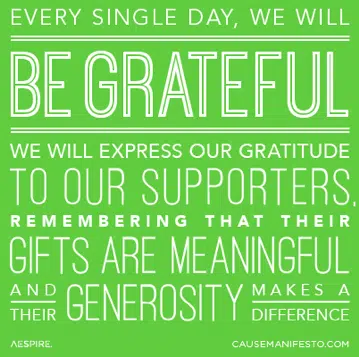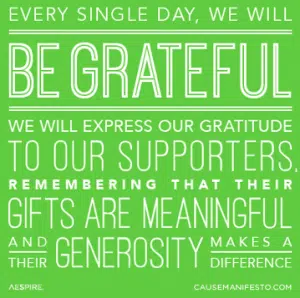Actions Speak Louder Than Words In Fundraising



Over time, the relationship with a nonprofit that I support had changed. My gifts of time, pro bono services, and financial gifts were unappreciated and taken for granted; I felt they were no longer meaningful to the cause.
I was delighted when the newly appointed leader of this organization called to ask if we would be willing to continue our support, instead of assuming that we were still interested. He took the time to meet with me and explain that our help was crucial to their cause, and asked if we would be willing to continue our work.

That’s the way it should be.
When it comes to donor engagement, it’s not always what you say, it’s often how you say it, and when you say it. My colleague’s perspective on gratitude was refreshing: “When I get busy and need to refocus, I write thank you notes.”
Small actions often speak louder than big words in fundraising. A thank you note leaves an impression that may last for years.
When you begin your day with the perspective that all communications are donor communications, every choice you make to design for impact and communicate with clarity must support that perspective. How you express gratitude for every gift is an opportunity to be authentic, and steward a relationship with your supporters.
Ask the donor why they are making the gift, and what it means to them. Ask them what they might be expecting in return (if anything). Never assume anything. You won’t know what their true motivation is until you ask — whether it’s altruistic, for personal recognition, or the greater good — or somewhere in between.
If you ask, you will be able to express your organization’s gratitude for the gift in a way that is most meaningful to the donor. Over time, you’ll be able to gather relevant information as to why your supporters believe in your cause.
Being grateful is a cultural principle that acknowledges to your supporters that their gifts are meaningful, and their generosity makes a difference. Understanding your supporter’s motivation acknowledges your awareness of how the donor feels about giving, not just about the gift itself.
Begin today with a resolution:
“Every single day, we will be grateful. We will express our gratitude to our supporters, remembering that their gifts are meaningful, and their generosity makes a difference.”
This article was adapted from Raise Your Voice: A Cause Manifesto.

Comments
Brian Sooy
Barbara352